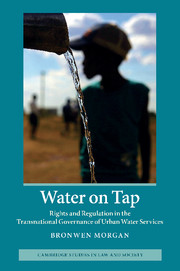Book contents
- Frontmatter
- Contents
- List of figures
- List of tables
- Acknowledgements
- Introduction: The field of global water policy: struggles over redistribution and recognition
- 1 Rights, regulation and disputing: a conflict-centred approach to transnational governance
- 2 Managed liberalisation and the dual face of French water services provision
- 3 ‘Another world is possible’: Bolivia and the emergence of a participatory public provision model for access to urban water services
- 4 Regulatory arbitrage and popcorn politics: contrasting disputing pathways in Argentina and Chile
- 5 Moonlight plumbers in comparative perspective: electoral v. constitutional politics of access to water in South Africa and New Zealand
- 6 Law's work: legality and identity in transnational spaces
- Epilogue
- References
- Index
- CAMBRIDGE STUDIES IN LAW AND SOCIETY
2 - Managed liberalisation and the dual face of French water services provision
Published online by Cambridge University Press: 03 May 2011
- Frontmatter
- Contents
- List of figures
- List of tables
- Acknowledgements
- Introduction: The field of global water policy: struggles over redistribution and recognition
- 1 Rights, regulation and disputing: a conflict-centred approach to transnational governance
- 2 Managed liberalisation and the dual face of French water services provision
- 3 ‘Another world is possible’: Bolivia and the emergence of a participatory public provision model for access to urban water services
- 4 Regulatory arbitrage and popcorn politics: contrasting disputing pathways in Argentina and Chile
- 5 Moonlight plumbers in comparative perspective: electoral v. constitutional politics of access to water in South Africa and New Zealand
- 6 Law's work: legality and identity in transnational spaces
- Epilogue
- References
- Index
- CAMBRIDGE STUDIES IN LAW AND SOCIETY
Summary
Introduction
This chapter tells the story of how the French state and French actors responded to the problem of access to water by promoting the diffusion of ‘managed liberalisation’ as a governance model. The story is primarily one of changing institutions, both domestically and internationally. France is both an exemplar of the European ‘social model’ and a major force in shaping the global field of urban water services delivery in an international development context. As a result, the French role in constructing a ‘human face’ for a globalising water policy sector has both ‘inside’ and ‘outside’ aspects, grounded not only on long-standing colonial links between developed and developing countries but also on a two-faced conception of ‘le service public’. Internally, French water services policy uneasily reconciled private sector delivery of water services with a constitutional vision of equal access for all citizens by means of a vision of ‘le service public’ secured by political regulation and individual citizen rights under administrative law. Externally, in a global context lacking any overarching controlling state, securing ‘le service public’ for disadvantaged citizens became a much more peripheral aspect of the overall policy framework, and the French approach became embedded in the broader policies and practices of international organisations including the World Bank and the UN, as summarised in the Introduction. This linked water services delivery to institutions more readily associated with liberal market economies such as that of the UK – arm's-length quasi-independent regulatory agencies, discretionary ‘solidarity’ mechanisms, and an overarching legal framework for the global economy that prioritises property and contract rights.
- Type
- Chapter
- Information
- Water on TapRights and Regulation in the Transnational Governance of Urban Water Services, pp. 49 - 84Publisher: Cambridge University PressPrint publication year: 2011
- 1
- Cited by

